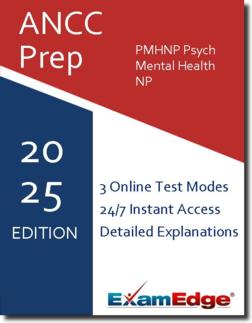ANCC PMHNP Psych-Mental Health NP (PMHNP) Practice Tests & Test Prep by Exam Edge - Topics
Based on 22 Reviews
- Real Exam Simulation: Timed questions and matching content build comfort for your ANCC PMHNP Psych-Mental Health NP test day.
- Instant, 24/7 Access: Web-based ANCC Psychiatric-Mental Health Nurse Practitioner (Across the Lifespan) practice exams with no software needed.
- Clear Explanations: Step-by-step answers and explanations for your ANCC exam to strengthen understanding.
- Boosted Confidence: Reduces anxiety and improves test-taking skills to ace your ANCC Psychiatric-Mental Health Nurse Practitioner (Across the Lifespan) (PMHNP).

Understanding the exact breakdown of the ANCC Psychiatric-Mental Health Nurse Practitioner (Across the Lifespan) test will help you know what to expect and how to most effectively prepare. The ANCC Psychiatric-Mental Health Nurse Practitioner (Across the Lifespan) has 150 multiple-choice questions The exam will be broken down into the sections below:
| ANCC Psychiatric-Mental Health Nurse Practitioner (Across the Lifespan) Exam Blueprint | ||
|---|---|---|
| Domain Name | % | Number of Questions |
| Scientific Foundation | 15% | 23 |
| Advanced Practice Skills | 20% | 30 |
| Diagnosis and Treatment | 55% | 83 |
| Professional Practice and Policy | 10% | 15 |


